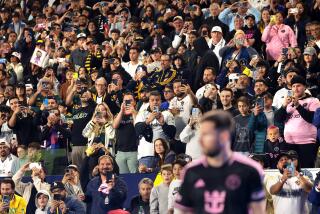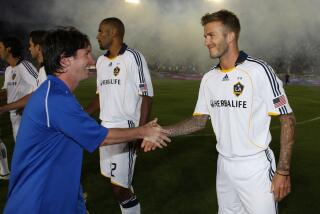David Beckham’s legacy: his game vs. his celebrity
We haven’t seen the last of David Beckham. Oh, sure, we may not see him on a soccer field now that he’s announced he will retire after Paris Saint-Germain’s final game on May 26. But we will see him in many other places — billboards, magazines, TV — for years to come.
There are still Beckham-backed shoes, cologne, cell phones and watches to sell. And sports drinks, vitamins, books and clothing lines. There may even be a sewing machine in the works. “Mend it Like Beckham” anyone?
“Commercially, David Beckham is the most successful footballer ever produced in England,” says David Haigh, chief executive of Brand Finance, a global consultancy firm.
Yet Brand Beckham remains a creation, a Frankenstein’s monster built by his management team with parts provided by focus groups, advertising agencies and pop-culture sensibilities. Just take a look at how Beckham’s hairstyle has evolved over the years, from the wild shoulder-length Johnny Damon-like locks at Real Madrid in 2003 to the mature business-like ‘do he wore for Paris Saint-Germain this season.
At heart Beckham has always been, first and foremost, a soccer player. Growing up the son of a hairdresser and a repairman in London’s East End, Beckham knew when he entered grade school that soccer “was the only thing I ever wanted to do.”
And it showed. On the field he was passionate, relaxed and unrehearsed. As a pitchman, however, he was guarded, careful and protective. On several occasions after wide-ranging interviews with Beckham, I received calls from his management team clarifying their client’s views on numerous topics. But they never asked what he said about soccer.
The message was clear: Beckham’s image was their business, the sport was his.
At his best he was brilliant, earning more caps with the English national team than any field player in history. A master of set pieces, he was the first English player to score in three World Cup finals — two of those goals coming on direct free kicks, making him the fifth player in history to do that.
But as good as he was — he twice finished second in voting for FIFA’s world player of the year — Beckham was rarely the best player on his team. What he excelled at was making those around him better. So though he scored more than 12 goals in a season just once in a 20-year career, he has the second-most assists in European Championship finals history and is third on the all-time English Premier League list.
Later he would bring Major League Soccer worldwide respect and attention while winning two league titles with the Galaxy, making him the only British player to win domestic championships in four countries.
“On the field, he will ultimately be remembered as a winner,” said ESPN soccer commentator Alexi Lalas who, as president of the Galaxy, helped engineer the deal that brought Beckham to the U.S. in 2007. “Beckham is a player who, at times, was maligned and yet, time and time again, was able to provide moments of brilliance under incredible pressure.”
In many ways then, Beckham left the East End but never forgot the values he learned there. He would attend his children’s flag-football games even though he didn’t understand the sport. He was once thrown out of a West L.A. park for objecting to a referee’s call during a youth soccer match.
And while he clearly enjoyed being a celebrity — especially in Los Angeles — he never seemed to consider himself one. He would excitedly tell stories about seeing movie stars such as Al Pacino walking down the street, oblivious to the fact he lived in the same neighborhood. Then there was the time he was waiting to use the bathroom at a Lakers game and Jack Nicholson came out of the stall.
Beckham was stunned when Nicholson addressed him by name.
“Moments like that,” he said excitedly “are amazing.”
There are likely to be more moments like that for Beckham, who could soon be back in Southern California as part of an MLS ownership group. He almost certainly will be back to shoot any number of magazine covers and TV commercials, which begs a sad question: How, ultimately, will David Beckham be remembered?
By the time Joe DiMaggio had become a stooped, gray-haired man, more people knew him as Mr. Coffee, spokesman for a home coffeemaker, than as the Yankee Clipper, one of the most graceful center fielders in baseball history.
In announcing his retirement last week, Beckham left little doubt what kind of legacy he’d like to leave. And it has nothing to do with underwear.
“I just want people to see me as a hard-working footballer. Someone that’s passionate about the game and someone that every time I stepped on the pitch, I’ve given everything that I have because that’s how I feel,” he said in a TV interview. “Over the years it’s been my life and my career. People have obviously looked at certain other things that have gone on throughout my career and I think sometimes that’s overshadowed what I’ve done on the pitch. As much as I say that doesn’t hurt me, of course it does.
“At the end of the day I’m a footballer.”
twitter.com/ kbaxter11







